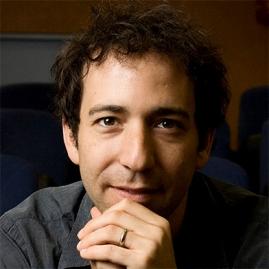
Michael Elowitz is a Professor of Biology and Biological Engineering; Investigator, Howard Hughes Medical Institute; Executive Officer for Biological Engineering. Michael Elowitz seeks to understand how core cellular capabilities such as communication, decision-making, and epigenetic memory are implemented by molecular circuits of interacting genes and proteins. The lab combines the engineering of synthetic circuits with mathematical modeling of natural circuits, and single cell dynamic analysis techniques. Projects aim to improve our ability to predictably control cellular behaviors, and provide a foundation for a new generation of cell-based biomedical devices.
Research
The lab uses these synthetic biology and single cell dynamic approaches to analyze or implement core cellular capabilities. Examples of recent work include the following:
- To understand multicellular development programs, we have begun to reconstitute morphogen patterning outside of embryos. By generating and analyzing Sonic Hedgehog morphogen gradients in real time, for natural and re-wired variants of the Hedgehog signaling pathway, we showed how its unusual molecular architecture enables accurate multicellular patterning (see Li et al, Science 2018).
- Why do communication pathways such as BMP and Notch use many promiscuously interacting ligands and receptors? Our recent work shows how these systems provide unanticipated types of specificity, enabling cells to address messages to specific cell types or convey multiple distinct messages to other cells (Antebi et al, Cell 2017; Nandagopal et al, Cell 2018).
- We engineer synthetic “MEMOIR” systems that can record cell histories in the genome in a format that can be reconstructed by in situ end-point analysis (Frieda et al, Nature 2017).
- We developed a bottom-up system for analyzing the dynamic effects of different epigenetic regulators at the single-cell level. This work revealed how probabilistic all-or-none silencing and reactivation events enable chromatin regulators to modulate the fraction of cells silenced and provide a framework for understanding and engineering mammalian chromatin regulation and epigenetic memory. (Bintu et al, Science 2016).
For more information please visit http://www.elowitz.caltech.edu/
